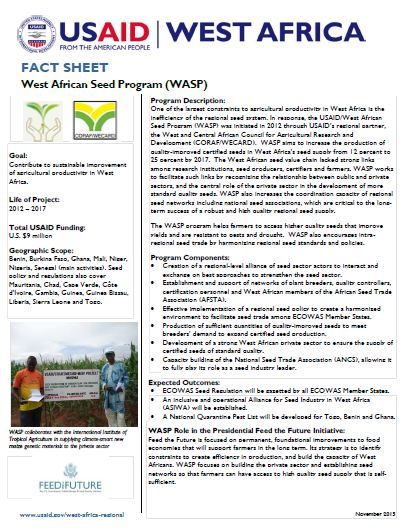West African Seed Program (WASP) ![]() (pdf - 160k)
(pdf - 160k)
Goal:
Contribute to sustainable improvement of agricultural productivity in West Africa.
Life of Project:
2012 – 2017
Total USAID Funding:
U.S. $9 million
Geographic Scope:
Benin, Burkina Faso, Ghana, Mali, Niger, Nigeria, Senegal (main activities). Seed policy and regulations also cover Mauritania, Chad, Cape Verde, Cote d’Ivoire, Gambia, Guinea, Guinea Bissau, Liberia, Sierra Leone and Togo.
Program Description:
One of the largest constraints to agricultural productivity in West Africa is the inefficiency of the regional seed system. In response, the USAID/West African Seed Program (WASP) was initiated in 2012 through USAID’s regional partner, the West and Central African Council for Agricultural Research and Development (CORAF/WECARD). WASP aims to increase the production of quality-improved certified seeds in West Africa’s seed supply from 12 percent to 25 percent by 2017. The West African seed value chain lacked strong links among research institutions, seed producers, certifiers and farmers. WASP works to facilitate such links by recognizing the relationship between public and private sectors, and the central role of the private sector in the development of more standard quality seeds. WASP also increases the coordination capacity of regional seed networks including national seed associations, which are critical to the long-term success of a robust and high quality regional seed supply.
The WASP program helps farmers to access higher quality seeds that improve yields and are resistant to pests and drought. WASP also encourages intra-regional seed trade by harmonizing regional seed standards and policies.
Program Components:
• Creation of a regional-level alliance of seed sector actors to interact and exchange on best approaches to strengthen the seed sector.
• Establishment and support of networks of plant breeders, quality controllers, certification personnel and West African members of the African Seed Trade Association (AFSTA).
• Effective implementation of a regional seed policy to create a harmonized environment to facilitate seed trade among ECOWAS Member States.
• Production of sufficient quantities of quality-improved seeds to meet breeders’ demand to expand certified seed production.
• Development of a strong West African private sector to ensure the supply of certified seeds of standard quality.
• Capacity building of the National Seed Trade Association (ANCS), allowing it to fully play its role as a seed industry leader.
Expected Outcomes:
• ECOWAS Seed Regulation will be gazetted by all ECOWAS Member States.
• An inclusive and operational Alliance for Seed Industry in West Africa (ASIWA) will be established.
• A National Quarantine Pest List will be developed for Togo, Benin and Ghana.
WASP Role in the Presidential Feed the Future Initiative:
Feed the Future is focused on permanent, foundational improvements to food economies that will support farmers in the long term. Its strategy is to identify constraints to create efficiency in production, and build the capacity of West Africans. WASP focuses on building the private sector and establishing seed networks so that farmers can have access to high quality seed supply that is self-sufficient.








Comment
Make a general inquiry or suggest an improvement.